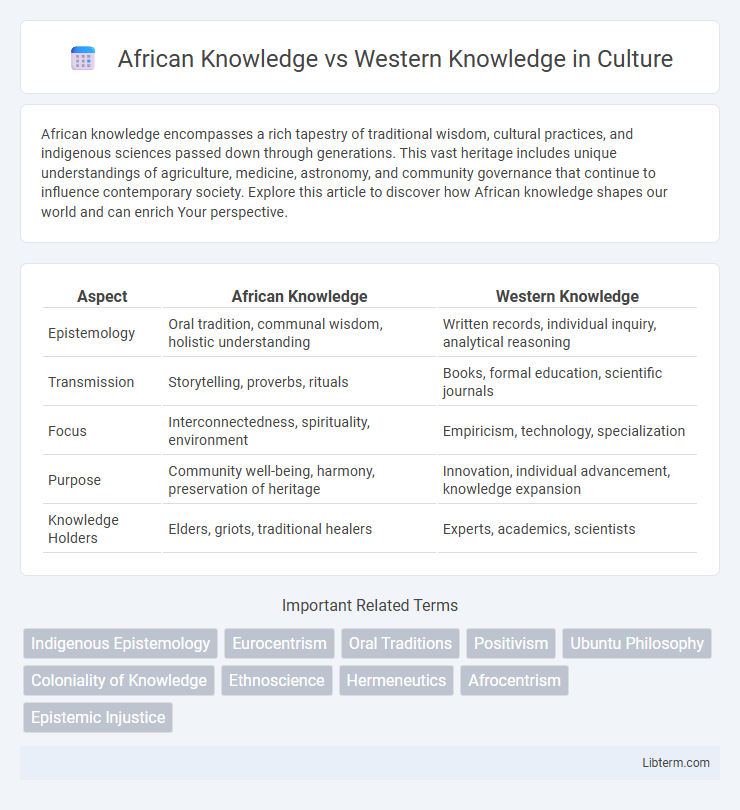African knowledge encompasses a rich tapestry of traditional wisdom, cultural practices, and indigenous sciences passed down through generations. This vast heritage includes unique understandings of agriculture, medicine, astronomy, and community governance that continue to influence contemporary society. Explore this article to discover how African knowledge shapes our world and can enrich Your perspective.
Table of Comparison
| Aspect | African Knowledge | Western Knowledge |
|---|---|---|
| Epistemology | Oral tradition, communal wisdom, holistic understanding | Written records, individual inquiry, analytical reasoning |
| Transmission | Storytelling, proverbs, rituals | Books, formal education, scientific journals |
| Focus | Interconnectedness, spirituality, environment | Empiricism, technology, specialization |
| Purpose | Community well-being, harmony, preservation of heritage | Innovation, individual advancement, knowledge expansion |
| Knowledge Holders | Elders, griots, traditional healers | Experts, academics, scientists |
Defining African Knowledge and Western Knowledge
African Knowledge encompasses indigenous wisdom, oral traditions, and communal values rooted in African cultures, emphasizing holistic understanding and ancestral connections. Western Knowledge is characterized by systematic scientific inquiry, empirical evidence, and individualistic perspectives developed through Enlightenment principles and modern academia. Both knowledge systems offer unique insights, reflecting diverse epistemologies shaped by distinct historical and cultural contexts.
Historical Contexts Shaping Each Knowledge System
African knowledge systems, deeply rooted in oral traditions, communal experiences, and indigenous practices, have evolved over millennia through storytelling, proverbs, and collective memory, reflecting the continent's diverse cultures and environments. Western knowledge, shaped by the Scientific Revolution and Enlightenment, emphasizes empirical evidence, individualism, and written documentation, driven by historical events like colonialism and industrialization. The historical contexts of colonization disrupted African knowledge transmission, imposing Western epistemologies that often marginalized indigenous perspectives but also led to complex intercultural exchanges shaping contemporary understanding.
Philosophical Foundations: Ubuntu vs. Individualism
African knowledge is deeply rooted in the philosophical foundation of Ubuntu, emphasizing collective identity, interconnectedness, and community well-being. Western knowledge, by contrast, often centers on individualism, valuing personal autonomy, self-reliance, and independent reasoning. These contrasting worldviews shape approaches to ethics, governance, and social responsibility in their respective societies.
Epistemology: Ways of Knowing in Africa and the West
African epistemology emphasizes communal knowledge, oral traditions, and spiritual insights as valid ways of knowing, contrasting with Western epistemology's focus on empirical evidence, individual reasoning, and scientific methodology. Indigenous African knowledge systems integrate lived experiences and ancestral wisdom, highlighting the interconnectedness of knowledge, ethics, and social responsibility. Western epistemology tends to prioritize objective analysis and formal logic, often separating knowledge from cultural and spiritual contexts.
Oral Traditions vs. Written Records
African knowledge systems prioritize oral traditions, emphasizing storytelling, proverbs, and communal memory to preserve history and cultural values across generations. Western knowledge predominantly relies on written records, such as books, academic journals, and official documents, to establish verifiability and chronological accuracy. The oral nature of African knowledge fosters adaptability and contextual understanding, while written Western records support systematic documentation and widespread dissemination of information.
The Role of Community and Elders in Knowledge Transmission
African knowledge systems emphasize oral traditions where elders serve as vital custodians of collective wisdom, ensuring the transmission of cultural values and practical skills through storytelling and communal participation. Community involvement fosters intergenerational learning, reinforcing social cohesion and shared identity, unlike Western models that often prioritize individual academic achievement and formal institutional education. This communal approach in African societies integrates experiential learning with moral guidance, preserving truth and heritage across generations.
Scientific Approaches: Indigenous Practices vs. Western Methods
African knowledge systems emphasize holistic scientific approaches rooted in indigenous practices, integrating community-based observation, experiential learning, and sustainable resource use. Western methods prioritize empirical evidence, experimental validation, and technological innovation within formal institutions, often focusing on reductionist and specialist techniques. The synergy between indigenous African knowledge and Western scientific methods offers valuable insights for addressing complex ecological and social challenges.
Education Systems: Comparative Perspectives
African education systems emphasize community-based learning, oral traditions, and indigenous knowledge, fostering cultural identity and practical skills development. Western education prioritizes formal curricula, standardized testing, and individual achievement, often aligned with global competitiveness and technological advancement. Comparative perspectives highlight the need for integrative models that value both indigenous epistemologies and scientific methodologies to enhance educational outcomes worldwide.
Modern Applications and Challenges in Integration
African knowledge systems offer deep contextual understanding of sustainable agriculture and community-based healthcare, presenting unique opportunities for modern applications in environmental management and public health innovation. Western knowledge emphasizes technological advancements and standardized methodologies, which can complement African indigenous practices but often face challenges in integrating diverse epistemologies and addressing power imbalances. Successful integration requires adaptive frameworks that respect cultural values, promote equitable knowledge exchange, and leverage both systems to solve complex socio-economic and environmental problems.
Towards Knowledge Pluralism: Bridging the Divide
African knowledge systems emphasize communal values, oral traditions, and holistic understandings of the environment, contrasting with Western knowledge's focus on individualism and scientific empiricism. Embracing knowledge pluralism requires integrating indigenous African epistemologies with Western methodologies to foster inclusive, interdisciplinary solutions. Bridging this divide enriches global knowledge by validating diverse worldviews and promoting equitable intellectual exchanges.
African Knowledge Infographic

 libterm.com
libterm.com